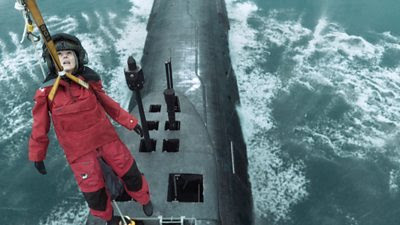Do you know about closed-circle plots for thrillers?
These are detective novels where the crime – usually a murder or murders – occurs within a small, isolated group of people. That means that the perpetrator, generally the murderer, must be someone within that group. Well, within the group of survivors, since the murderer isn’t often – ever? – his or her own victim.
The leading proponent of the genre must be Agatha Christie. The murderer is one of the passengers on the Orient Express, or on the Nile pleasure cruise, or on the island only reachable by boat, or whatever.
I’ve always thought of this genre as a ‘submarine plot’. I’m sure I didn’t invent the term. I think I heard it used in a radio broadcast, or read it in a newspaper. ‘Submarine’ strikes me as a good word, because it sums up neatly the sense of an enclosed, even claustrophobic place, where any threat is magnified ten times over.
My father’s war service was in bombers for the Royal Air Force. That has always struck me as pretty scary. I mean, even when I was a frequent flyer for work, I’d sometimes feel a twinge of apprehension when I boarded a plane. All that weight taking to the air? It’s so unnatural.
Add the prospect of being shot at while you’re up there, and the whole experience strikes me as frankly terrifying.
But even my father used to say that there was something far worse, something he could never have brought himself to do. That was join the submarine service.
“Locked up in a floating coffin?” he used to say. “Not on your life.”
 |
| Suranne Jones as DCI Amy Silva and Adam James as Lieutenant Commander Mark Prentice in the claustrophobic atmosphere of the submarine |
That’s what made the series Vigil such fun to watch (made by the BBC, we saw it on HBO Max). I’m not claiming that it’s outstanding, just that it’s highly satisfying. Even its faults are positives: the ‘submarine plot’ thriller generally has subplots which can be highly predictable (you know, the pair that’s bound to become a couple, for instance), and Vigil sticks firmly to that well-worn but comfortable tradition.
It also sticks to another far more vital convention, that the outcome should not be obvious, and suspense is maintained. What’s more, there should be a good few red herrings along the way and, boy, Vigil provides plenty of them. Above all, though, I liked it because it’s a submarine story mostly set on a submarine. Isn’t that just how things should be? I mean, love stories always involve love, and superhero stories always star superheroes, but this is the first submarine-plot story I’ve come across actually featuring a submarine.
You can imagine the way that setting allows the suspense to ratchet up, along with the sense of claustrophobia, of impending doom, of general threat hanging over everything and everybody. Vigil does that all superbly well.
 |
| Suranne Jones being winched aboard the sub Not the least tense scene |
 |
| Rose Leslie as DS Kirsten Longacre leading the enquiry on land |
It was both a pleasure and a relief to see her playing a reasonably substantial part again, a starring role in a six-part series.
So I had plenty of reasons for enjoying Vigil. And you might find some more, if you give it a try. Not a classic, I admit, but a tense, compelling show and a good way to pass the time on dark winter evenings.
No comments:
Post a Comment